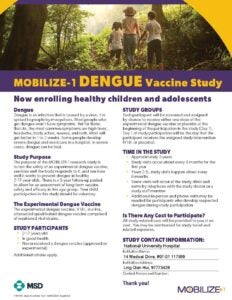A healthy volunteer is someone with no known significant health problems who participates in clinical trial study to test a new drug, device, or intervention.
Other than healthy volunteers, patients can also take up a proactive role by participating in a clinical trial to discover new ways to treat their current health problems.
Both groups provide researchers with crucial data because their health information can be used as a comparison. In some studies, researchers need to compare healthy volunteers with people who have a specific disease or condition. Research with healthy volunteers is designed to develop new knowledge, not to provide direct benefit to study participants.
If you are interested in joining a clinical trial, kindly click here now!
Clinical trials are clinical research studies conducted to investigate new treatments such as a new drug compound in human volunteers or research participants. Clinical trials can also look at other aspects of care, such as improving the quality of life for people with chronic illnesses.
Such research takes a cautious and progress in a sequential or phase approach. Research is conducted into new medications or therapeutic goods but can also involve products that are already available on the market, for further improvement.
Clinical trials offer hope for many people and an opportunity to help researchers find better treatments for others in the future.
All Clinical Trials carried out in Singapore are carefully designed to be as safe as possible and have to go through multiple layers of approval by an Institutional Review Board (IRB)/Ethics Committee (EC) and the Health Sciences Authority (HSA) before the trial is allowed to be carried out.
The goals of an IRB is to ensure that the participants’ rights, safety, confidentiality and well-being are being protected. All Clinical Trials are highly regulated and are to be conducted in accordance to International Conference on Harmonization Good Clinical Practice (ICH GCP).
Remember, no treatment is completely safe for everyone. However, a clinical trial helps make sure the benefits outweigh the possible risks for most people.
Depending on the design of the Clinical Trial,
There are many ways to conduct a clinical trial. To prevent any bias in the results, trials may be double-blinded, blinded or randomized, based on the study design or protocol. In general, clinical trials are conducted and managed by a professional study team and will ensure the volunteers’ safety and rights throughout the duration of the clinical trial.
Volunteers who meet the inclusion-exclusion criteria of a Clinical Trial are eligible to participate in that specified trial. Depending on the phase of the Clinical Trial, type of volunteers required can either be healthy volunteers or volunteers with specified medical conditions. Whatever the age, race, gender or background – clinical trials need heroes like you today!
If you wish to find out whether you are eligible to be a volunteer, feel free to send your enquiries to volunteer@nuhs.edu.sg today and we will be there to answer any questions that you have!
If you have found a Clinical Trial that you are interested in, do consider these few questions before agreeing to participate in the trial. Do feel free to reach out to any of the study team members for more information.
- 1. How long will the trial last?
- 2. What is the main purpose of the trial?
- 3. What are the potential risks involved?
- 4. What are the intended use of the drugs?
- 5. What procedures are involved?
- 6. Do I have to pay for any part of the trial?
Number 1 – It will benefit you!
By volunteering, you will gain access to new, experimental and cutting-edge treatment options before it is made available to the public. On top of that, you will be attended by a medical team that will carefully monitor your overall health during the duration of the clinical trial, ensuring your safety at all times!
Number 2 – It will benefit others, including your loved ones!
If you knew that your loved ones have a disease or illness that is genetic, your participation could result in new and better treatment options for your loved ones in future! Ultimately, if the study were to be proven successful, it could be the one that leads to a cure.
Number 3 – It will benefit clinical research as a whole!
Clinical trials are the only way to determine the safety and efficacy of new drugs and treatments. Information gathered from clinical trials will help advance researchers and scientists’ understanding of the disease or illness and improving the quality of life for people with chronic illnesses.
It is so simple!
Just express your interest via IMU’s Volunteer Registration page.
Step up and be a hero for others today!



